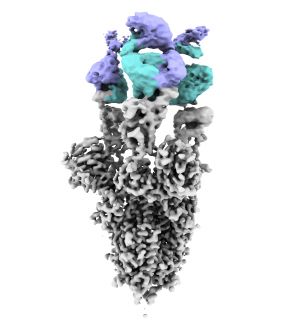The isolation of the new antibody has been possible thanks to blood samples from a patient infected with SARS-CoV-2 in March 2020, during the first wave of the pandemic. From these samples, some B lymphocytes were selected, the blood cells responsible for producing antibodies. Specifically, those generating specific antibodies against the spike protein, which allows the virus to infect human cells, multiply, and trigger COVID-19, were chosen.
The researchers reproduced these antibodies in the laboratory using genetic engineering techniques. Once this was achieved, they evaluated their neutralizing activity in vitro, that is, their ability to bind to the virus and block it, against the different variants of SARS-CoV-2 existing up to that point. Thus, they were able to select the antibody that managed to neutralize all of them, including XBB.1.16 and BA.2.86, from which the most concerning variants currently derive. As Giuliana Magri, one of the study's leader and researcher at the Hospital del Mar Research Institute during its execution, points out, "our antibody maintains neutralizing activity against all variants of SARS-CoV-2." At the same time, Benjamin Trinité, one of the study's first authors and senior researcher at IrsiCaixa, highlights the importance of the results and mentions that "the latest virus variants have incorporated dozens of mutations that hinder the work of previously developed antibodies, as they cannot bind as effectively. Having a treatment that is effective even as new variants of SARS-CoV-2 appear can change the rules of the game in combating the infection."
Also prophylactic capacity
The study analyzed in a mouse model the therapeutic capacity of the antibody, but also the prophylactic, that is, preventive, activity of the new treatment, certifying its ability to significantly reduce lung lesions and viral load. In this sense, Magri emphasizes that the study "demonstrates that the developed antibody shows prophylactic activity and not only therapeutic, a fact that identifies it as a potential candidate for preventive clinical interventions and treatment of the infection."
Finally, the team carried out a detailed analysis of the antibody's structure bound to the spike protein, in order to understand its functioning and how it manages to maintain neutralizing activity, despite the mutations accumulated by the SARS-CoV-2 virus. This structural study, carried out at the CNB-CSIC by Rocío Arranz's team, co-leader of the study, allows stating that "this antibody has the ability to bind to a wide area of the virus spike, which gives it the ability to neutralize all variants and prevent new mutations from evading this neutralization. This suggests that, in this interaction area, there is a conserved region in the spike, which could be essential for the virus's ability to infect human cells."
Before its development for use in patients, a clinical trial in humans will have to be carried out. For now, there is an active European patent associated with this project.
"Having antibodies like 17T2 is key to protecting immunocompromised individuals and those at high risk of developing severe COVID-19. The results obtained show us that it is possible to design tools capable of blocking all variants of the same virus. In fact, it opens the way to the design of pan-coronavirus antibodies and/or vaccines, that is, with the ability to combat different types of coronaviruses", concludes Julià Blanco, co-leader of the study and IGTP researcher at IrsiCaixa.
More information
de Campos-Mata, L., Trinité, B., Modrego, A. et al. A monoclonal antibody targeting a large surface of the receptor binding motif shows pan-neutralizing SARS-CoV-2 activity. Nat Commun 15, 1051 (2024). https://doi.org/10.1038/s41467-024-45171-9






